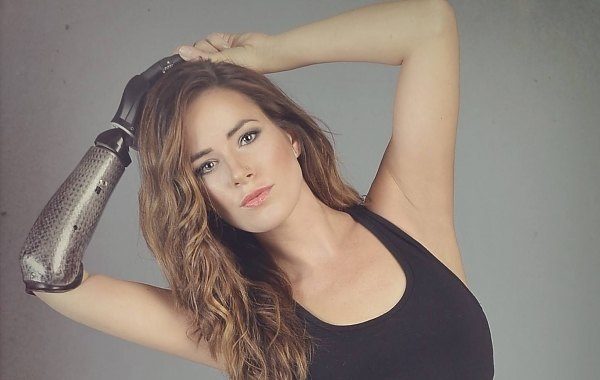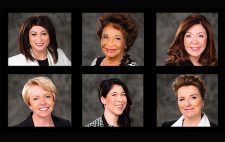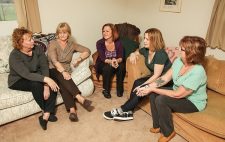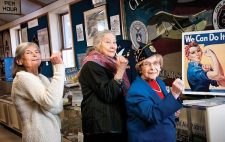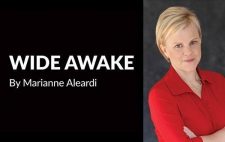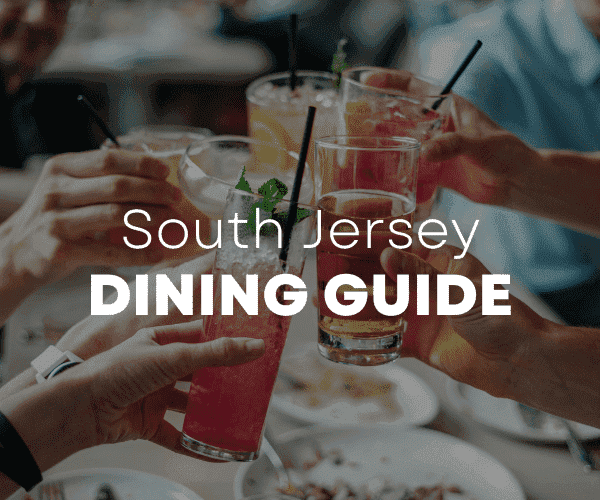Rebekah Marine has always known she wanted to model. She says a life in front of the lens came very naturally to her.
“As a kid I always played dress-up and made up photo shoots,” the West Deptford resident says. “I was always a ham for the camera. It was a natural thing for me to choose.”
It was not, however, natural for casting directors to see Marine as a fit for their ad campaigns and runway shows. Marine, 29, was born without a right forearm and wears a prosthesis. Though it was an uphill battle, her arm, an i-limb™ quantum made by Touch Bionics, is what ultimately landed her the all-important first gig, launching Marine into the world of modeling.
“I had a lot of insecurities during my teenage years, most of which were in my head,” she remembers. “It was me putting myself down and not feeling comfortable in my body. When I hit like 22, I said, ‘I have to make a change. I can’t keep feeling insecure about my body. I need to own it.’ I was in the process of getting a new prosthetic hand, and a friend said, ‘You should model it and be a spokesperson for their company.’”
Things took off from there. Marine appeared in Nordstrom’s 2015 anniversary catalog and has now walked the FTL Moda runway show at three consecutive New York Fashion Weeks. She’s proud of her prosthesis and the unique image it affords her, but at first she was unsure if drawing attention to it played to a strength.
“When I started I always wanted to be just one of the models and be part of the group,” she says. “I had to convince photographers and designers I was worthy of being in the industry. On one of my first shoots I had a photographer who constantly told me to angle my body so you wouldn’t see my hand. That frustrated me.”
“A few years went by, and I realized, ‘Hey, I have a really cool niche I’m not taking advantage of.’ I’ve been more successful since then. It’s kind of full disclosure – it’s who I am. I understand in the industry I’m not going to be the right model for everybody, and that’s OK. I’m confident I can be seen as a successful model.”
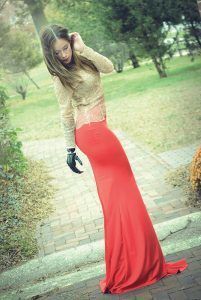
Rebekah Marine promotes herself as the “Bionic Model”
Marine began calling herself the “Bionic Model” and getting cast in campaigns and shows not despite her prosthesis, but because of it. She worked with other “limb-different” models, like Taylor Urruela, who lost his right leg in Iraq. Photos from the pair’s steamy shoot became popular online, with people praising the models for bringing awareness to the amputee and limb-different community.
“I never thought it’d get this big and become this inspirational for people all over the world,” Marine says. “It was just something that was fun I was doing to build confidence for myself.”
Marine says FTL Moda’s values align with her personal mission to make fashion more inclusive, particularly for more diverse body types. In addition to the “Bionic Model,” the label’s recent runway shows have featured wheelchair-bound models and Madeline Stuart, a model with Down syndrome.
“I’m only 5’3”, which is considered very short for a model,” Marine says. “That’s been a bigger challenge than my arm, ironically. I think we’re really demonstrating that you don’t have to be this perfect person to be beautiful or to be in the fashion industry. I believe fashion is for everyone, and we should be showing that in the industry.”
Marine says that philosophy applies not just to the fashion world, but to other high-visibility industries as well – Hollywood among them.
“They did the ‘Mad Max: Fury Road’ movie, and the main character is an amputee,” Marine says. “ It was Charlize Theron who played the part, and she’s clearly not an amputee. I think that’s a shame, and it’s something Hollywood is really missing out on. They had an opportunity to cast an actor who was actually an amputee, and they chose not to.”
Marine works to spread her message of body positivity, acceptance and diversity through organizations like the Lucky Fin Project, which supports children born with limb differences. The nonprofit, for which Marine serves as an ambassador, gets its name from the Pixar movie “Finding Nemo,” whose title character has an under-developed appendage he calls his “lucky fin.”
“The Lucky Fin Project supports those with upper-body limb differences,” she says. “I get to do a lot of interaction with parents and their kids, giving advice and answering questions. When I was growing up I didn’t have somebody I could ask questions. It’s nice to be able to be that person for kids and their families.”
Marine has received national attention for her work, but she says the highlight of her career happened on a local level, when she was named a “Mighty Girl” by the GALS group at Woodbury’s Evergreen Avenue Elementary School. The GALS – which stands for “Girls, Athletes/Artists-Leaders-Scholars” – use the distinction to honor women in the community, country or world who are working to improve the lives of other girls and women. Marine, a Woodbury High School alumna, surprised the group with a visit.
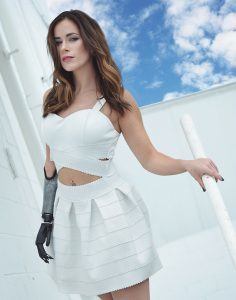 “That was probably the coolest thing that’s ever happened to me,” she says. “I’m a local girl, and I like giving back to the community. Having them recognize me and find me inspiring is so humbling. I love being able to give back to the kids – especially little girls. There’s so much pressure, especially with social media, to look and act a certain way. It’s so important to teach them that being you is perfect. It’s the best way to live your life, because there’s only one you. It’s important to be you, love life and embrace your differences.”
“That was probably the coolest thing that’s ever happened to me,” she says. “I’m a local girl, and I like giving back to the community. Having them recognize me and find me inspiring is so humbling. I love being able to give back to the kids – especially little girls. There’s so much pressure, especially with social media, to look and act a certain way. It’s so important to teach them that being you is perfect. It’s the best way to live your life, because there’s only one you. It’s important to be you, love life and embrace your differences.”
Marine doesn’t plan to model forever, and once that chapter of her career closes she has plans to continue her quest to aid both limb-different and able-bodied people, especially teenagers.
“Age is admittedly against me in the fashion industry,” she says. “After I’ve done the whole modeling thing, I really want to write a book for teenagers. I feel like that’s such an overlooked area of women who probably need some guidance. That’s when I felt insecure about myself and when I got into my own head. I think those are the years when it’s so important to learn about diversity and confidence.”
Though Marine is pleased with the increased representation of differently abled people in pop culture, she thinks there is much more work to be done.
“We’ve come a long way,” she says. “What we’re doing is opening the discussion about amputees. People are becoming more educated about it. I think there’s a huge change in the education side of it, and that’s why people are so much more accepting of it.”
When Marine speaks about her experiences, certain words are notably absent from her vocabulary.
“I don’t say I have a ‘disability’ or call people ‘handicapped.’ We’re not really handicapped, we’re just different. I just do things a little differently. I tie my shoes differently. I put my hair in a ponytail differently. I can still do everything everyone else can do. Well,” she laughs, “except the monkey bars.”

